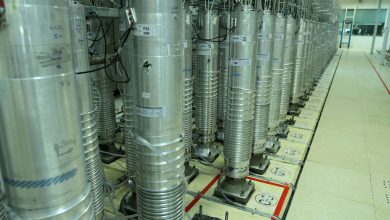Death of Iranian activist in prison must be investigated, HRW says


Nasiri had begun a hunger strike in September and later asked to be transferred out of a ward that included prisoners convicted of violent crimes, two sources told HRW (AFP)
Iranian authorities should immediately carry out an independent and impartial investigation into the death of an imprisoned activist who had been on hunger strike, Human Rights Watch (HRW) has said.
The US-based organisation said on Thursday that anyone found responsible of wrongdoing in the death of Vahid Sayadi Nasiri should be held accountable.
Iranian authorities have systematically failed to conduct transparent investigations into the cases of at least four people who died in custody during 2018, HRW said.
On 13 December, authorities informed the family of Nasiri, who had been convicted of "insulting the Supreme Leader and sacred belief and propaganda against the state", that he had died in a hospital in Qom.
Nasiri had begun a hunger strike in September, and later asked to be transferred out of a ward that included prisoners convicted of violent crimes, two sources told HRW.
"The deaths of dissidents and others whom Iran's judiciary should never have imprisoned in the first place is a deadly travesty of justice," said Michael Page, deputy Middle East director at the American non-governmental organisation.
"Iranian authorities have a responsibility to protect the lives of all detainees and impartially investigate any deaths that occur."
READ MORE►
Sick, untreated and tormented: How Iranian authorities leave prisoners to suffer
Mehdi Kaheh, the prosecutor of Qom, told reporters on 13 December that Nasiri was suffering from "liver issues", that "his condition deteriorated in detention", and that he died after seven days in the hospital.
However, Nasiri's sister, Elaheh, told US-funded Radio Farda on 14 December that he had been transferred to the hospital a week before for gastrointestinal bleeding and was transferred back to the prison.
"The night before when his health deteriorated, he was hospitalised again for a couple of hours," she said.
According to Radio Farda, the medical examiners told Elaheh that the hunger strike, gastrointestinal bleeding, and a "failure of bowel and liver" were the causes of Nasiri's death.
Radio Farda reported that the government had pardoned Nasiri, who was serving an eight-year sentence for social media posts, on 16 March – but that he was rearrested on the same charges on 23 July.
On 15 December, the Iranian Students News Agency (ISNA) quoted an unnamed source as saying that authorities had arrested Nasiri in 2015 for "membership in a terrorist group and planning to take actions", adding that he had been sentenced to five years in prison.
Iran's prison system 'a morgue'
Iranian authorities have yet to conduct any transparent investigation into five deaths in detention during 2018, but have claimed that three cases were suicides, HRW said.
On 4 March, authorities informed the family of Mohammed Raji, a member of the Dervish minority arrested during police clashes with the community on 19 and 20 February, that he had died in custody.
The authorities have refused to provide any explanation and have threatened reprisals against his family if they speak about it publicly, HRW said.
On 10 February, the family of Kavous Seyed Emami, a well-known Iranian-Canadian environmentalist and professor arrested as part of a crackdown against environmental activists on 24 and 25 January, reported that he had died in detention under unknown circumstances.
Iranian authorities said that he committed suicide, but have not conducted an impartial investigation into his death.
On 7 and 8 January, in the aftermath of mass arrests that followed protests across the country, activists reported the deaths of Sina Ghanbari and Vahid Heidari, one in Tehran and the other in Arak.
Authorities said that both committed suicide.
Other detained activists remain at risk according to HRW.
Farhad Meysami, a human rights defender who was arrested for his peaceful activism against compulsory hijab laws, has been on a hunger strike since 1 August and his condition has deteriorated, his mother reported.
The Centre for Human Rights in Iran has reported that authorities moved Meysami to the medical facility in Evin prison, where he has been held in isolation.
On 29 November, a group of United Nations human rights experts expressed alarm at Meysami's condition, and said they were "deeply disturbed" by the denial of his due process guarantees.
"Competent, impartial investigations into prisoners' deaths are an essential first step for ending the impunity of abusive and negligent officials who are turning Iran's prison system into a morgue for imprisoned activists and critics," Page said.
[contf]
[contfnew]

middle east eye
[contfnewc]
[contfnewc]




